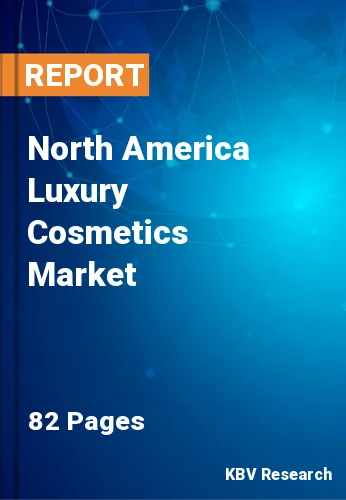The North America Luxury Cosmetics Market would witness market growth of 3.5% CAGR during the forecast period (2019-2025). Initially, luxury products targeted a specific class that consisted of the elite and wealthy customers; however, this pattern changed over the period of time. The urban population of developing economy and a surge in health concerns has boosted the need for luxury products that are manufactured with premium quality ingredients. This consumer pattern has fundamentally influenced the growth of luxury cosmetics market across the globe.
The growing online retail and an emerging demand for organic personal care and cosmetic products show a strong potential for the market growth over the years to come. Multiple factors lie taxation and import duties might also obstruct the growth. And to overshadow such factors, new trends like halal cosmetics demand could boost the market for luxury cosmetics.
The market players are adopting progressive strategies to leverage the opportunities of the market. Companies are focusing on innovative strategies to compete in the market space.
For example, in October 2017, Coty (US) came into partnership with Burberry for developing luxury fragrances, skincare and cosmetic products. The company, in April 2019, extended its partnership agreement with Marc Jacobs for developing long-term fragrance products.
In June 2018, L’Oréal took over Nanda Co. Ltd. for enhancing its luxury beauty products portfolio. The same year, in October, the company acquired Logocos Naturkosmetik AG for the expansion of its natural beauty product portfolio.
Likewise, in July 2016, (Japan) Shiseido agreed to develop and distribute Dolce?Gabbana’s fragrance, makeup and skincare lines and products. Further, in August 2019, the company came into partnership with Tory Burch for the development and distribution of Tory Burch beauty brands.
Madi International, a popular distributor in the beauty care sector in the Middle East, launched two advanced skin care product ranges of SKEYNDOR, a world-renowned skin care brand. The second UNIQCURE concentrate variety boosts the beauty advantages of popular cosmetic products with more than 35 particularly chosen and optimized effective components using SKEYNDOR technology to obtain outstanding skin outcomes. It puts together the brand's expertise of over 50 years of studies and the most advanced technology to provide all females, without exception, with personalized, specific solutions.
The Luxury Cosmetics market report has segmented the market on the basis of type, product type, end-user, distribution channel, and region. Organic and conventional products are covered in the type segment. The product type segment comprises skincare, makeup, haircare, and fragrances. On the basis of end-user, the market is categorized into males and females. The distribution channel segment includes e-commerce, specialty/mono-brand stores, supermarket/hypermarket, and others. The regional market is studied across USA, Canada, Mexico and Rest of North America.
The major market players expanding their reach in the North America luxury cosmetics market are L’Oréal, Christian Dior, Shiseido Company, Limited, Puig, Coty Inc., Revlon, Inc., Kao Corporation, Oriflame Cosmetics AG, The Estée Lauder Companies Inc., and KOSé Corporation. The market players are adopting progressive strategies to leverage the opportunities of the market. Companies are focusing on innovative strategies to compete in the market space.
Market Segmentation:
By Type
By Product Type
By Distribution Channel
By End User
By Country
Companies Profiled
Our team of dedicated experts can provide you with attractive expansion opportunities for your business.

